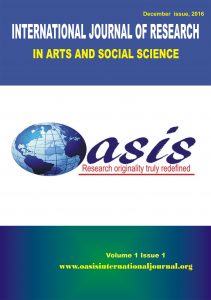LANGUAGE USE IN EDUCATION AND ETHNIC CONFLICT AND CHALLENGES AMIDST COMPETING
LINGUISTIC ALLEGIANCES: THE CASE OF THE LUNDAS AND THE LUVALES
IN ZAMBEZI DISTRICT, ZAMBIA
¹Chipo Kasoma, ²Lisa Kwaleyela and ³Gosnell L. Yorke (Ph.D)
¹ UNICEF, Lusaka, Zambia
²‚³ Dag Hammarskjӧld Institute for Peace and Conflict Studies,
Copperbelt University, Zambia
International Journal of Arts and Social Sciences (IJRASS)
Oasis International Journal series
Vol. 1 No. 1
December 2016

Abstract
In Zambia, the debate surrounding whether or not it is much more salutary to instruct children in their first language (L1) or mother tongue in the early stages of their academic development appears to have subsided in the last two decades, in favour of its proponents. Undoubtedly, this more valorizing and somewhat conflict-mitigating view of African languages is due, in no small measure, to the establishment of the African Academy of Languages (ACALAN) in Bamako, Mali, in 2001 under the theme, “African Languages for a Peaceful, Prosperous and Integrated Africa”. Scholars have consistently challenged the traditional practice by most African states of adopting ex-colonial languages as a medium of
instruction in schools. This is because research has shown that native speakers forced to learn in a foreign language tend to lag behind in their academic development as they attempt to first learn the new (imposed) language. Based on this realisation, in 2013, Zambia set trends among many African countries by adopting a policy of teaching in local languages at lower grade levels (grades 1-4). This policy is reported to be working remarkably well in most parts of the country. For example, the May 2016 Joint Annual Review (JAR) by the Ministry of General Education and Cooperating Partners, covering a sample of 40 schools across the country, revealed a significant increase in test scores, literacy and numeracy, compared to the last two years before adoption of the policy. Further research, however, has also shown that implementation of this commendable policy has come with its own linguistic challenges in Zambezi District, Zambia. Zambezi District has suffered a long-standing conflict over language use between the Lunda and the Luvale ethnic communities, dating back to precolonial times. This article seeks to highlight the conflicts and challenges faced in the implementation of the local language policy in education in Zambezi District among the
Lundas and the Luvales. In addition, it offers recommendations that might help mitigate and/or manage the prevailing ethnic conflict induced by this policy-driven use of language in education.
Key words: African
Keywords: African Academy of Languages, Education, Ethnic Conflict and Challenges, Language Use, Lunda, Luvale, Zambezi District and Zambia.

Open Access
This is an open access journal which means that all the content is freely available without charge to the user or his/her institution. Users are allowed to read, download, copy, print, search, or link to the full texts of the articles for their personal use, and/or use them for any other lawful purpose, without asking prior permission from the publisher or the author. This is in accordance with the BOAI definition of open access.

Oasis International Researchers Forum
Be a member of Oasis International Researchers Forum. A team that promote education globally, provide a platform for exchange of innovative ideas among academia, organize conferences, workshop and seminars where findings from various research studies will be intellectually discussed as well as encourage young researchers in their various field of studies.

Authors Guideline
Papers submitted should follow the Oasis International Journal authors’ guideline and not be under concurrent consideration at another journal.
Any potential data overlap with previous studies should be noted and described in the letter to the Editor.
